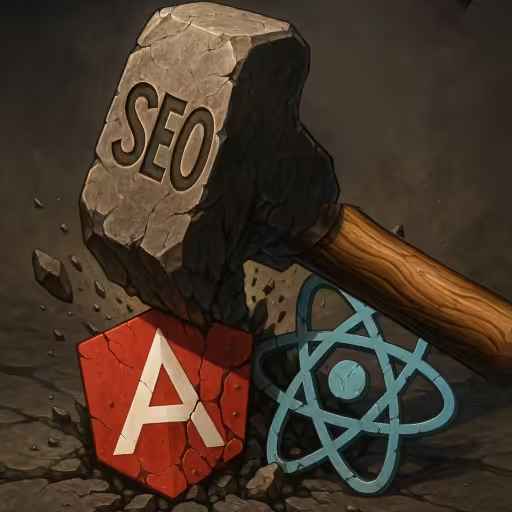The Dark Side of Modern JS: How Frameworks Can Hurt Your SEO
Modern JavaScript frameworks like Angular, React, and Vue have revolutionized how we build dynamic, app-like websites, but the brutal turth is, when it comes to SEO-critical and content-heavy pages (like blogs), they're often more of a headache than a help.
If you've ever wrestled with Angular SSR quirks, fought hydration errors in React, or hacked together Renderer2 solutions just to get Google to index your blog properly—you know exactly what I'm talking about.
Angular, React, Vue—all these flashy component-based frameworks—kinda suck for static, SEO-critical content out of the box. They can be coerced to work (like using a Renderer2 "hack" in Angular), but you're constantly fighting the nature of the tool.
In this article, we'll break down:
✅ When Angular and React make sense—and when they don't
✅ Why static site generators (SSGs) are still unbeatable for pure content
✅ Concrete examples of SSG tools you can adopt
✅ How to implement a hybrid architecture, combining SPAs with static sites
✅ Why PHP and WordPress remain relevant for SEO-first blogs
Let's cut through the hype and get real about modern web dev.
When Are Angular, React, or Vue a Bad Fit?
Angular, React, and similar SPA frameworks excel at building:
- Interactive dashboards or admin panels
- Complex forms or step-by-step wizards
- Authenticated user portals
- Highly dynamic, user-driven interfaces
But when it comes to static content—blog posts, marketing pages, SEO-first sites—they often:
🚫 Rely on client-side rendering, making initial pages blank for crawlers
🚫 Require extra setup (SSR or hydration) to work for SEO
🚫 Produce bloated JavaScript bundles
🚫 Require manual workarounds for dynamic content injection
Even with Server-Side Rendering (SSR), you're duct-taping static content onto tools designed for apps, not content-driven websites.
Static Site Generators: Still King for SEO
Static Site Generators (SSGs) build your site ahead of time—HTML, CSS, and minimal JS served to the user and bots alike. Benefits:
✅ Near-instant load times
✅ Minimal JavaScript overhead
✅ Fantastic SEO and social sharing support
✅ Lower server costs with CDN hosting
✅ Simpler debugging and deployment
Popular SSG Options with Examples
Static Site Generators (SSGs) have become increasingly popular in recent years, and for good reason. They offer a range of benefits, including fast page loads, improved security, and simplified deployment. However, with so many SSG options available, it can be difficult to know where to start.
In this section, we'll take a look at some of the most popular SSG options, along with examples of how to get started with each one. Whether you're building a blog, marketing site, or e-commerce platform, there's an SSG out there that's right for you.
Astro Web Framework
Astro is a web framework for content-driven websites, and can be created using the npm command:
npm create astro@latestAstro Features:
- Partial hydration: static by default, hydrate only what's interactive
- Markdown, MDX, or CMS-driven blogs supported
- Perfect for blending static pages with modern components
Next.js (React)
Next.js is a popular React-based framework for building server-rendered, statically generated, and performance-optimized web applications. One of its key features is the ability to export your application as a static site:
// next.config.js
module.exports = { output: 'export' };Next.js (React) Static Build Features:
- Pages pre-built as HTML during build time
- Can still use dynamic React where needed
Hugo (Go-based)
Hugo, the popular static site generator, uses its own built-in web server (which is written in Go) to act as a minimal server that serves static files and handles basic HTTP requests. They claim to be "the world's fastest framework for building websites".
You can install the Hugo framwork using Homebrew's brew command like so:
brew install hugo
hugo new site my-blogHugo Features:
- Blazing fast build times
- Ideal for content-heavy blogs
Eleventy (11ty)
Eleventy, also known as "11ty", is a popular static site generator (SSG) that allows you to build fast, scalable, and customizable websites using a variety of templating languages and technologies.
Use Node's npx command-line tool to install the packages, and serve the web app:
npx @11ty/eleventy --serveEleventy Features:
- Flexible templating with minimal dependencies
- Great for SEO-focused projects
Why Use Static Site Generators?
For a tech blog or marketing site with 90% static content, an SSG (like the ones listed above) ensures:
- Pre-rendered HTML for every page
- Lightning-fast page loads
- No hydration hacks required
- Clean meta tags for SEO
PHP & WordPress: The OG SEO-Friendly Stack
It would be criminal to ignore the most battle-tested, widely-used tool for content-heavy websites: PHP, especially with WordPress.
Despite its age, PHP remains a powerhouse for SEO-driven blogs because:
✅ Server-rendered by default—ideal for search engine bots
✅ Huge ecosystem of SEO plugins and themes
✅ Content editors love the familiar WordPress interface
✅ Massive hosting support with affordable options
✅ Mature, well-understood tech for small teams and non-developers
For small businesses, solo creators, or marketing teams, a well-optimized WordPress site can still outperform fancier tech stacks when it comes to pure SEO.
How to Implement a Hybrid Approach
Many modern teams run two distinct frontends:
✅ Static site for content — Blogs, landing pages, documentation (Astro, Hugo, PHP/WordPress)
✅ SPA for app functionality — Dashboards, profiles, interactive tools (Angular, React)
Architecture Example
User → CDN → static.learnprogramming.us → Astro/WordPress site
User → CDN → app.learnprogramming.us → Angular SPA for interactive toolsSeamless UX: Link between static and app sections with consistent branding. Use subdomains or clear routing splits.
SEO Benefits: Search engines index the static site effortlessly, while your app remains optimized for interactivity.
Dev Separation: Teams can iterate on content and app features independently.
Bonus: Use shared design systems (CSS, component libraries) to maintain a consistent look.
Conclusion: Use the Right Tool for the Right Job
Choosing the right tech stack is about understanding trade-offs—not chasing hype.
Here's a practical comparison to guide your decision:
| Use Case | Best Tech Option | Pros | Cons |
|---|---|---|---|
| Content-heavy blog (SEO critical) | Astro, Hugo, 11ty, WordPress | Fast, SEO-friendly, simple deployment | Less dynamic by default |
| Marketing landing pages | Astro, Next.js (Static Export) | Static by default, partial interactivity | Requires build step for updates |
| Authenticated dashboards | Angular, React SPA | Highly interactive, robust app features | SEO requires extra setup (SSR, hydration) |
| CMS-driven sites for non-devs | WordPress, PHP | User-friendly, great SEO, vast plugin ecosystem | Can be legacy, less performant for complex apps |
| Hybrid app with SEO and interactivity | Separate static site + SPA | Best of both worlds, scalable | Slightly more complex deployment |
Final Thoughts:
- If your project is SEO-first, don't force Angular or React to do what an SSG or PHP site does effortlessly.
- If your site needs interactive tools or complex user flows, SPA frameworks shine.
- When you need both? A hybrid, multi-frontend approach keeps your architecture clean and your users—and search engines—happy.
The web is big enough for multiple tools to coexist. Use the right tech for the job, and your site will perform better, rank higher, and stay maintainable long-term.
Angular, React, Vue—they're amazing tools, but they're not one-size-fits-all. For SEO-heavy, content-first pages. Fighting your framework's defaults is exhausting. Instead, build smart, leverage the strengths of each tool, and deliver the best experience for users and search engines.
Need help architecting your hybrid stack? It's worth the upfront investment to avoid future headaches.
Happy coding—and may your blogs rank high and load fast!













